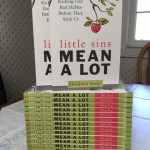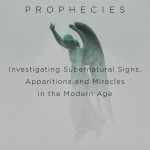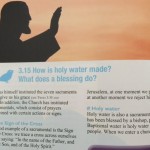I actually meant to talk about psalms yesterday, but somehow that post, almost from the first word, was taken out of my hands and morphed into this piece on Oblates and Tertiaries, and I’ve gotten to the point where I just don’t fight that sort of stuff anymore.
Those who check in from time to time to pray Morning Prayer or Vespers with me in the podcasts know that I consider psalmody a spiritual wellspring for our eternal thirst, and a most perfect reflection of the human condition in all of its muck and glory.
I also think of the psalms as a necessary disinfectant. No matter how good you think you are, when you catch yourself identifying with the darkest parts of the psalms, you cannot deny the opaque parts of your own soul. And when you are in the depths, feeling lower than a worm, nothing can buck you up so fully as a word from the psalmist, who knows that God is good.
In the funk of acedia, nothing, but nothing, works like psalmody to get you back on your feet, and ready to re-engage the world.
One of my rare complaints about monastics is that some of them – I stress only “some” – have made a misguided move to accent-u-ate the positive and elim-inate the negative in their breviaries. They’ve decided to omit the darker parts of the psalms – the cries for God to smite others, the self-loathing and doubt – because someone has floated the disturbing idea that we should only focus on “the good things.” That may sound lovely, but it leaves us spectacularly unprepared to deal with the corporal life or the spiritual life, both of which are often under assault by darkness within and darkness with-out.
A psalter without darkness is the spiritual equivalent of prozac. It takes away the highs and lows and leaves you drifting through a passionless and sterile middle ground, where everything is “fine” and nothing penetrates, and the weak spirit just sort of sags into inertia.
I have many “favorite” psalms. Off the top of my head, I will tell you that I love psalms 1, 24, 86, 110, 122 and 139, for very different reasons. With some I love the images, others the consolation, others the mystery. Yesterday I hit another of my faves, Psalm 19, particularly those first seven lines:
The heavens proclaim the glory of God,
and the firmament shows forth the work of his hands.
Day unto day takes up the story
and night unto night makes known the message.No speech, no word, no voice is heard
yet their span extends through all the earth,
their words to the utmost bounds of the world.There he has placed a tent for the sun;
it comes forth like a bridegroom coming from his tent,
rejoices like a champion to run its course.At the end of the sky is the rising of the sun;
to the furthest end of the sky is its course.
There is nothing concealed from its burning heat.
I wouldn’t blame you for wondering what’s so great about it; tastes are subjective. But what I like is the surprise of that seventh line. We begin with pure praise and the lovely poetry delivers us immediately into the cycle of life, the quiet affirmation that carries on, day through day, in the wind through trees, the crack of ice, the buzz of life into which we are so deeply embedded, we don’t even hear it, and here comes the sun! A champion, a bridegroom! The very gift and light of life, itself, running its course! And we cannot hide from its illumination…or its power to burn.
I love tra-la-ing along and then suddenly confronting the seriousness of the truth: it all comes with the burden of scrutiny and accountability. Mercy and Justice reside together, or not at all.
Psalmody, psalmody, psalmody. Whatever you’re wrestling with – bring yourself to the psalter. Open the pages and open your heart; “O God come to my assistance; O Lord, make haste to help me.” (Psalm 70).
You will be amazed. Seriously. Amazed.











